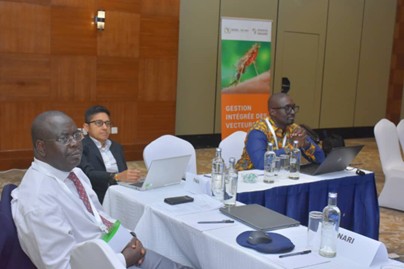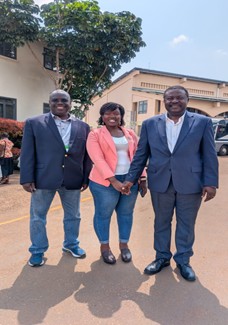TOWARDS MALARIA ERADICATION
The African Union Development Agency (AUDA-NEPAD), through its Africa Integrated Vector Management (IVC) Programme, hosted an East African regional engagement on biosafety and environmental regulation workshop themed advancing transboundary dialogue on research, regulation, and application of genetically modified mosquitoes for malaria control and elimination 12th -13th August 2025 in Kampala Uganda.
The meeting aims to foster a regional approach to regulation oversight, coordination and governance in the use of Genetically Modified Organisms (GMO) in East Africa. The primary objective was to initiate a structured, transboundary dialogue on emerging regulatory considerations surrounding the potential open-field release of genetically modified organisms (GMOs) for vector control. The engagement will help to identify and discuss shared regulatory challenges, risks, and opportunities that may arise.
Global malaria control remains unstable. According to the WHO World Malaria Report 2024, there were 263 million cases in 2023, with incidence rising to 60.4 per 1,000 at-risk people from 58.6 in 2022. Africa accounted for 94% of cases and 95% of an estimated 597,000 deaths, with Nigeria, Democratic Republic of Congo, Uganda, Ethiopia, and Mozambique making up over half of the total burden.
AUDA-NEPAD through its Integrated Vector Management (IVM) Programme, supports Member States in scaling up the regulation of the research and development of innovative vector management approach. As part of the strategy, AUDA-NEPAD has prioritized development of novel tools including Genetically Modified Mosquitoes. These efforts aim to strengthen the enabling environment for malaria elimination by enhancing the regulatory capacity of national institutions, promoting evidence-based decision-making, and fostering cross-country learning and cooperation. As part of this strategy, AUDA-NEPAD has prioritized the development of a strong regulatory ecosystem capable of safely and effectively overseeing the research, approval, and deployment of novel tools, including genetically modified mosquitoes. Participants in the consultative workshop were drawn from the East Africa Community states of Kenya Uganda, Tanzania, Rwanda, Burundi, Somalia, South Sudan and the Democratic Republic of Congo. The engagement will help to identify and discuss shared regulatory challenges, risks, and opportunities that may arise.
Dr Willy Tonui, the Chairman and Executive Director represented the African Genetic Biocontrol Consortium during the event. The Consortium is established as an agreement among member organizations committed to contribute and expand Africa’s self-determination through research, development, and use of genetic biocontrol approaches to control and eliminate malaria and other vector-borne diseases in Africa. Through the support of FNIH’s GeneConvene Global Collaborative , the Consortium has held a number of initiatives including capacity building workshops to build the capacity of journalists, science communicators and editors.
During the event Dr Tonui participated in a session on “Capacity Building Initiatives for Gene Drive Research and Regulation at the Regional and continental Initiatives and Global and International initiatives. In his talk he highlighted the role of GeneConvene and the Consortium in advancing best practices and informed decision making for development of genetic biocontrol technologies to improve public health globally by offering technical information, advice, training and coordination for research on gene drive and other genetic biocontrol technologies.
Through its motto the Consortium aims to build, Inform and expand opportunities for technical capacity strengthening, knowledge exchange and deliberation about the challenges and opportunities of genetic biocontrol technologies for the public good. The SCICOM Forum remains a key success story in building capacity and generating conversations among scientists and science communicators. Through the Science Communication workshops, the capacity of reporters and editors in the African region has been built to effectively report on science and biotechnology.

Dr. Brinda Dass from GeneConvene Global Collaborative and Dr. Willy Tonui representing the Consortium during the event.
During group sessions, delegates Identified strategies for handling biosafety and transboundary engagements expectations and road map. A regional Strategy on Biotechnology is being formulated, led by the Rwanda based East African Science and Technology Commission (EASTECO). “Such regional collaborations are useful in fostering knowledge and experience sharing and will go a long way in strengthening the much-needed alignment on the strategy, for the benefit of a safe and secure biotechnology regime in the region,” said Dr, Tonui, who is a consultant supporting the EAC Biotechnology Strategy development.
STUDY TOUR OF THE UGANDA VIRUS RESEARCH INSTITUTE (UVRI)
Uganda is among countries at the forefront of advancing research, containment and regulatory systems of emerging technologies that are being explored to complement existing vector control strategies. Delegates conclude the three-day event with a tour of the facility.
As part of Africa’s continued efforts to combat malaria and strengthen regulatory preparedness for innovative public health tools, genetically modified (GM) mosquitoes including gene drive technologies—are being explored to complement existing vector control strategies.
The aim of the tour was to strengthen regional technical and regulatory capacity for overseeing genetically modified mosquitoes, through practical exposure to Uganda’s operational and regulatory environment.
Brinda Dass, Senior Technical Expert and Policy Lead for Gene Drive at the GeneConvene Global Collaborative, Foundation for the National Institutes of Health, commended UVRI for its progress in setting a benchmark for other institutions in Africa in the development of vector control tools against malaria. She noted that establishing such an effective system requires time and encouraged other participants to draw lessons from these successful practices.

Dr. Willy Tonui, Brenda Nakazibwe and Prof. Pontiano Kaleebu, during the tour of Uganda Virus Research Institute (UVRI), Entebbe. The facility serves as a leading centre for entomological research, GM Mosquito containment and biosafety Systems Development.
